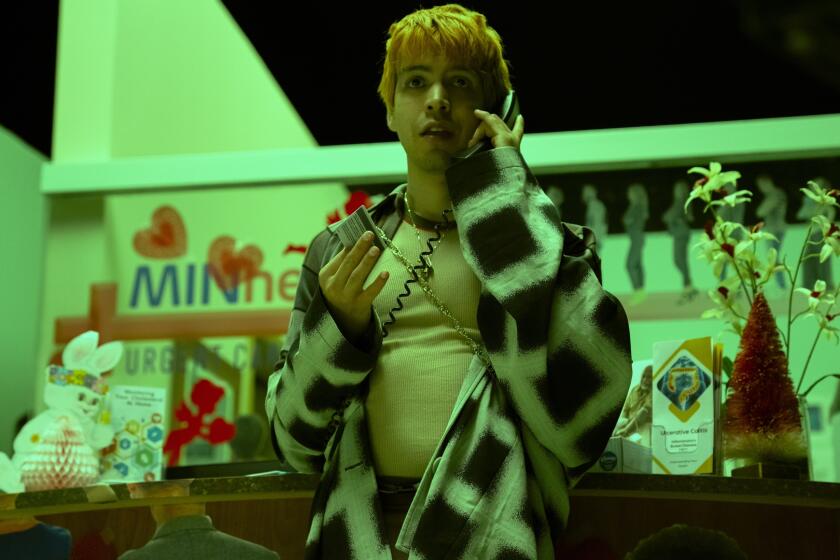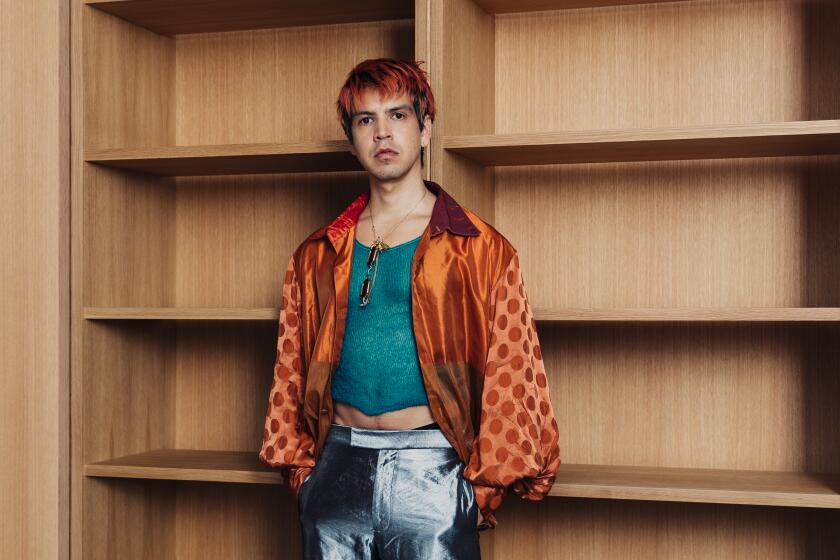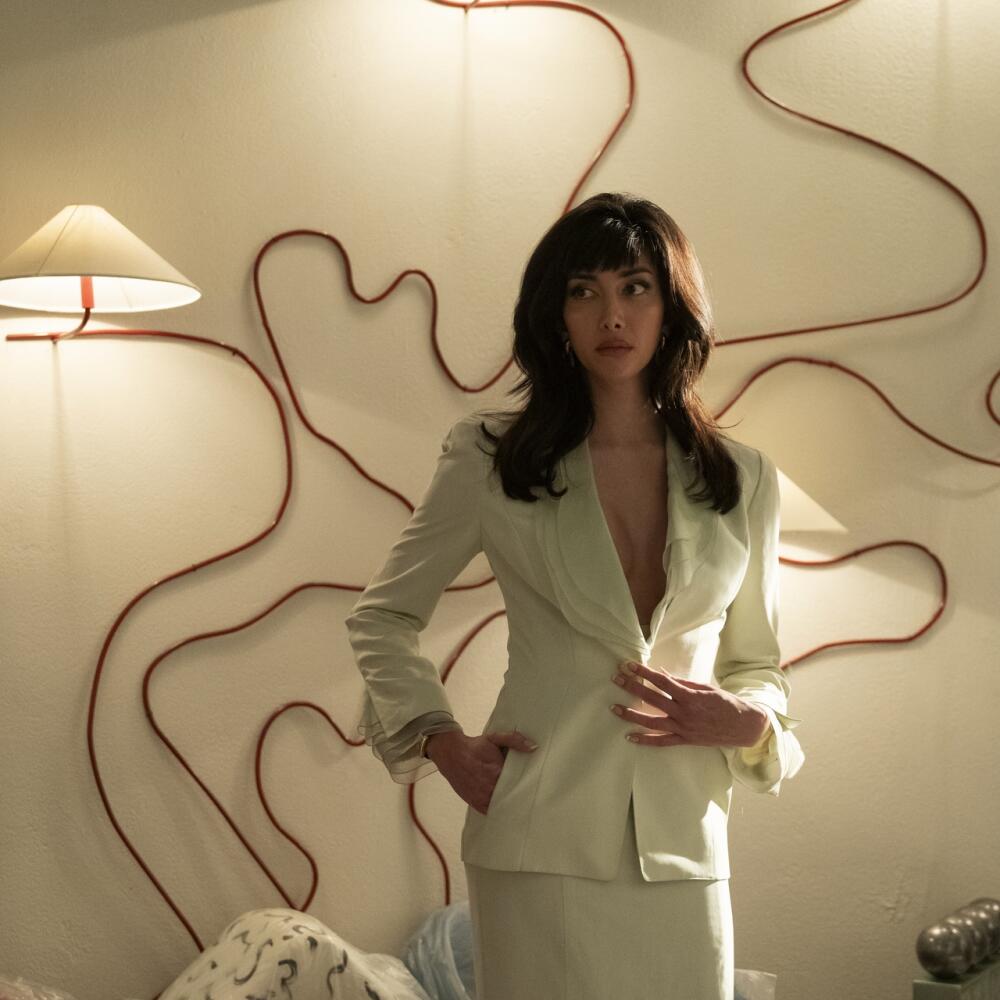
- Share via
In a show that boasts appearances by the likes of Emma Stone, Bowen Yang, Amy Sedaris and Aidy Bryant, Julio Torres’ “Fantasmas” may well make a TV star out of someone who aptly goes by a single name: Martine.
“This is the biggest role I’ve ever had,” Martine, a trans visual and performance artist, says via Zoom. “I’m officially the star of a television show. And it might also be my favorite TV show.”
For anyone who’s watched “Fantasmas,” that endorsement should double as insight into Martine’s own aesthetic and artistic sensibility. Because “Fantasmas” isn’t like any other television show out there.
The six-part urban fairy tale, which premiered June 7 on HBO and drops episodes weekly on Fridays through July 12, imagines a New York City where ExxonMobil builds developments and rideshare apps called Chester — with a driver named Chester — exist alongside mermaid sales reps and rodent nightclubs-turned-CVS pharmacies.
Julio Torres’ ‘Fantasmas,’ premiering Friday on HBO, is an absurdist queer comedy that comes on like Luis Buñuel by way of Gregg Araki.
Within that fantastical vision of New York, Torres’ Julio (who was hit by lightning as a child and is allergic to the color yellow) is constantly trying to eke out a living with the help of his robot assistant, Bibo (voiced by Joe Rumrill), and his agent, Vanesja (the “j” is silent), played by Martine.
“The show itself is kind of postgenre,” Martine suggests. “It’s very much a genre-building show. It’s hard to explain what you should expect to see.”
Every set piece in “Fantasmas” — whether it’s a sitcom called “MELF ” that riffs on “ALF ” and features Paul Dano, or a vignette focused on a zealous customer service rep played by “Euphoria’s” Alexa Demie — lays bare its crafted theatricality. It’s always clear that audiences are watching something shot on a set, with painted backdrops and makeshift props. This is a fanciful world that never pretends to be anything more than an absurd and absurdist take on everyday life.
1

2

1. Paul Dano, right, is featured in a skit about an “ALF”-like puppet named MELF. (Atsushi Nishijima/HBO) 2. Alexa Demie plays an overzealous customer service rep. (Monica Lek/HBO)
“It felt like theater,” Martine says of working on the show. “It felt like being onstage with an audience. Everything was built inside this one giant soundstage and it was all repurposed: The school becomes the nightclub, the nightclub becomes a rooftop. And the audience was everyone on set.”
Within this funhouse mirror of a show, which blends sketch comedy with a farcical plot that finds Julio wanting to avoid getting an ID that would serve as his “proof of existence,” Martine was similarly encouraged to play with her own identity — as a performer, artist and actor.
“I don’t recognize myself in the show,” she says. “Because it’s Vanesja. And I think Vanesja happened because I was so nervous about my performance. The only way for me to move ahead was to say, ‘You don’t have to be yourself. You can put forward some kind of armor, some kind of stronger, idealized person you want to move through the world as.’”
For Martine, the very idea of being “yourself” is elusive. Questioning the rigidity of our sense of self has long been at the heart of her art, which has been featured in galleries and art museums all over the country — not to mention at the Venice Biennale — and in magazines like Interview and Artforum.
“Who am I?” she wonders aloud. “I think I’m constantly trying to shed that definition. I think I’m constantly throwing it away, discarding the old skin, shedding it, as it were, to move into some wider, broader, stronger, faster model. Or predator or something.”
Such facetious language, which moves from the probing to the preposterous with ease and humor, is arguably why she gets along with Torres. Martine first met the Salvadoran comedian close to a decade ago at an archery championship. “It’s truly an unbelievable story,” she recalls. “Julio was there at the buffet. He’s vegan, and I was kind of pretending to be vegan at the same time.”
“Fantasmas,” a six-part series from Julio Torres, plays out like a fever dream and features the likes of Steve Buscemi, Julia Fox, Bowen Yang and Emma Stone.
They both reached for the last tater tot, and at the moment when their fingers touched and their eyes met, Martine knew she’d found a new friend. Maybe even more. “This is your sister wife,” she remembers thinking. “This is your kindred spirit, and you’re both starving … to be seen.”
What Torres most remembers about his first encounter with Martine was something equally ineffable. “Her ability to subvert her own physicality, to find humor in beauty,” he recalls via email.
Their friendship blossomed in between archery practices and congenial DMs as their careers bloomed in separate if complementary directions. While Torres joined the “Saturday Night Live” writing staff and later premiered his own comedy special (“My Favorite Shapes”), Martine was busy creating art installations that satirized advertising campaigns (Martine Jeans), a publication that similarly critiques glossy high-fashion magazines (Indigenous Woman) and sci-fi-set live performances (“Circle”) that toyed with ideas around gender, femininity and self-expression in equally cheeky and wryly self-serious ways.
Their earlier collaborations — Martine previously played an unimpressed gallerist in Torres’ feature film debut, “Problemista,” and an impaled beauty queen in his Peabody award-winning show “Los Espookys” — feel like playful preambles to their work together on “Fantasmas.” Vanesja is, after all, a performance artist who’s been playing Julio’s talent agent for so long, she’s lost track of whether it’s still a performance.
The actor-comedian’s first feature film, ‘Problemista,’ draws inspiration from his own byzantine immigration experience as well as surrealist paintings.
“Without Martine, there is no Vanesja,” Torres says. “That’s how I work sometimes, in collaboration with a performer to create something tailor-made for them. She first planted the seeds of Vanesja when leaving me cryptic voicemails. Something about closing a big deal and not being able to discuss it. We welcomed each other into our worlds.”
In the surreal world that is “Fantasmas,” Vanesja is a reminder of how we ourselves can often be indistinguishable from the makeshift roles we play.
“I think a lot of the show’s motifs exist in my work too,” Martine says. “I love mannequins. I love asking a lot of questions broadly about identity and using costumes and using personas to try and get to some deeper truth. And it was so refreshing to lean into that with comedy because the art world is so unbearably serious.”
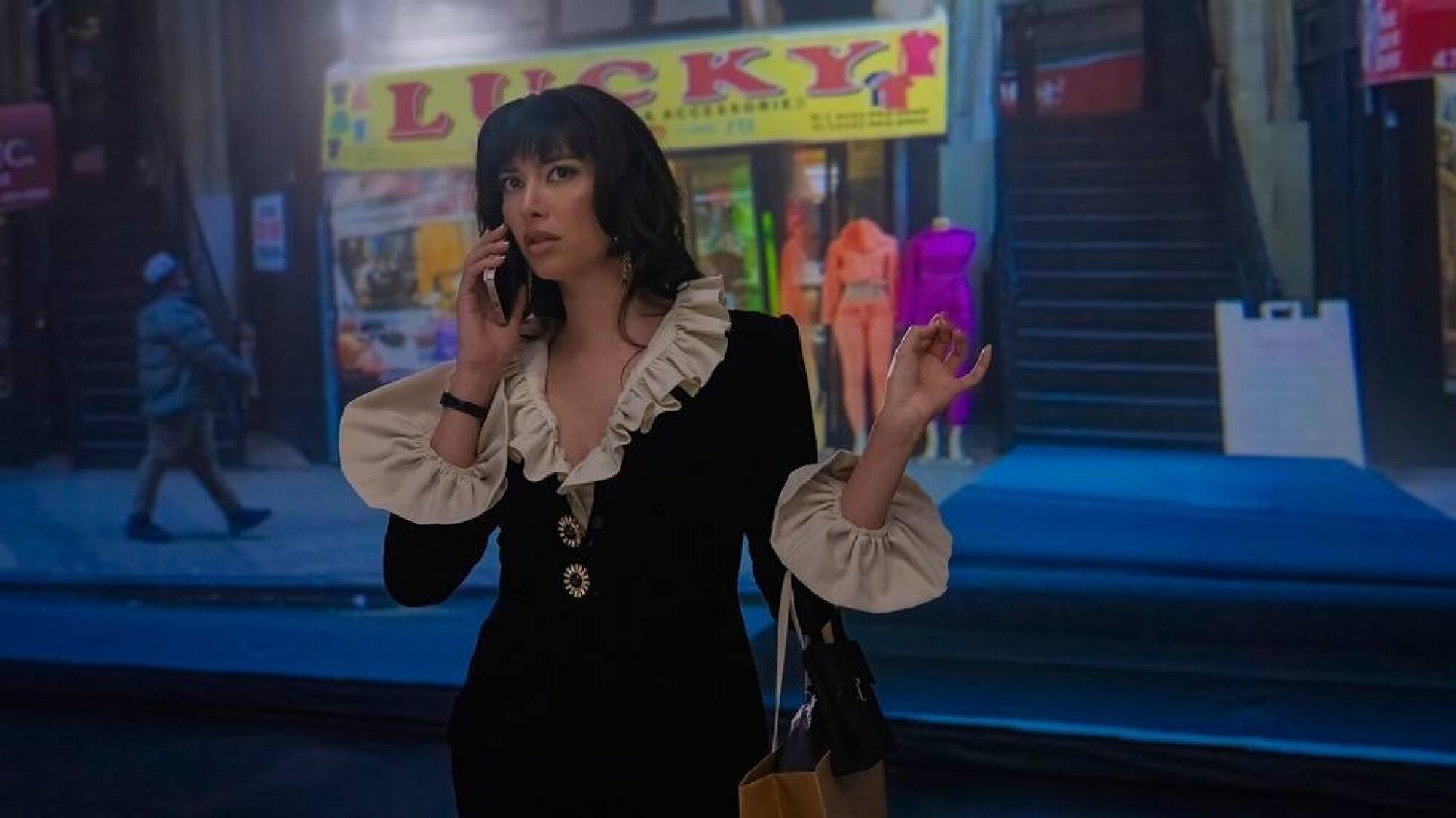
With Vanesja, you see Martine reveling in that comedy. With her droll sense of humor intact and Vanesja’s aesthetic aching to be described as “business executive realness,” she’s constructed a dry-witted performance of an artist-cum-agent whose indifference to the world around her is bewitching. There’s her voice, for starters, which is sultry and breathy, marked by a glacial pace that makes Julio and audiences alike become engrossed by her every word. She almost feels plucked from the late 1990s, when the blazers and pencil skirts Vanesja wears were synonymous with a feminine, if not outright feminist, brand of seriousness.
“Vanesja is classically binary,” Martine says. “She has both the charm of a woman and all the strength of a man.”
In working within such a gendered binary, I bluntly ask how she was able to create this entrancing character who seems aloof yet interested, cold yet warmhearted. How did she do it?
“How does she Vanesja?” she asks herself, in between laughter, wanting to clarify my question — knowing, perhaps, that she’s arrived at a key philosophical way of understanding her process and her character alike. “I Vanesja every day. I try to Vanesja at least once a day, just for flexibility and my health, my mental health.”
For Martine, getting a chance to create Vanesja alongside Torres was a joy because it allowed her to unearth parts of herself and her work that exist at the surface yet get at deep-seated ideas about who we are and how we present ourselves. At a purely visual level, though, she had a very simple reference in mind.
“I’m obsessed with Ursula from ‘The Little Mermaid’ when she becomes a cis woman,” she says. “Her name is Vanessa, and I do feel like there is a resemblance between that Vanessa and myself, just like out of drag. This was me trying to implement a villainous persona that I personally feel lives inside me.”
That hint of Disney wasn’t the only personal touch Martine brought to “Fantasmas.” She is to thank for what has already become one of the most talked-about images teased from the show, and seen in Friday’s episode: her scene partner, “Teen Wolf” star Dylan O’Brien, wearing red lacy undergarments, with garters and stockings to match.
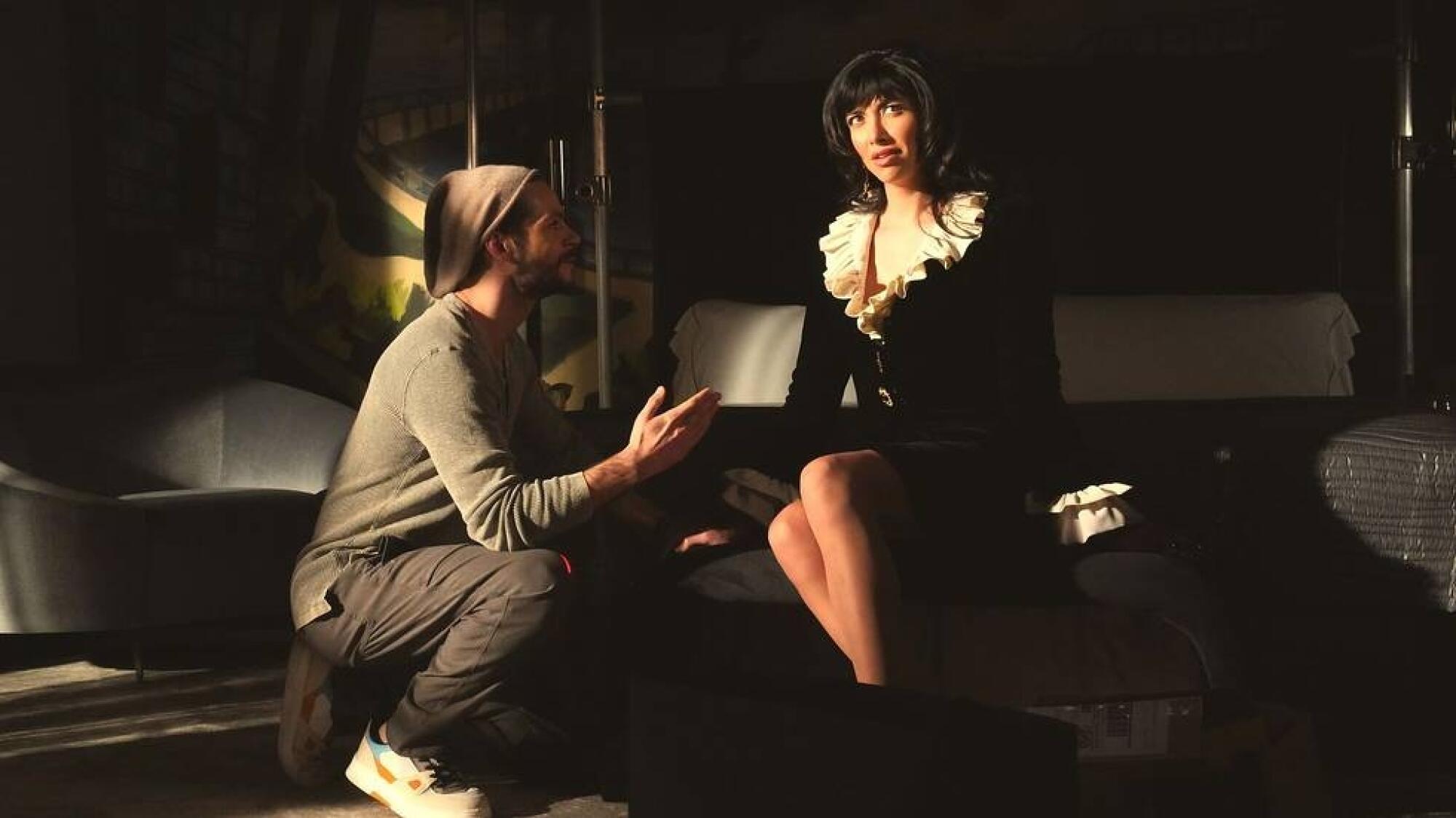
“That was probably my one contribution, narratively, to the show,” she admits. “It’s a personal taste thing. I think it’s really sexy to see a man in women’s lingerie. Dylan had no problems with it. He was so down. And he looked great.”
Such an incongruous image (in a scene that’s quite melancholy, not really all that steamy, in fact) doesn’t feel out of place in “Fantasmas.” The show, like Vanesja, embraces binaries only to bridge them. Or break them. Or perhaps just toy with them. But it can do so only because the series is fascinated by the personal dramas we all carry within. There’s a push toward empathy for the other that runs through the show, even in its most outlandish moments.
“‘Fantasmas’ is the people who populate it,” as Torres puts it. It’s a show “about characters who, with little screen time, aim to capture the curiosity of the viewers.”
Further echoing those words and in trying to sum up this off-kilter show’s ambitions, Martine is reminded of Jon Brion’s song “Little Person,” which he co-wrote with Charlie Kaufman for the filmmaker’s meta-theatrical opus “Synecdoche, New York.”
That 2008 film is centered on a theater director eager to celebrate the mundanity of real experiences. The only way he knows how is to put on a stage show of his own life and that of everyone he comes into contact with. “I’m just a little person,” Martine sings. “One person in a sea of many little people, who are not aware of me.”
“I feel like that’s everyone in New York,” she says. “And also everyone in ‘Fantasmas.’ You get this everything, everywhere all at once TikTok universe where every story is simultaneous. Where everyone is the lead in their own narrative. Which is kind of the closest thing to reality that you can get.”
More to Read
The complete guide to home viewing
Get Screen Gab for everything about the TV shows and streaming movies everyone’s talking about.
You may occasionally receive promotional content from the Los Angeles Times.
